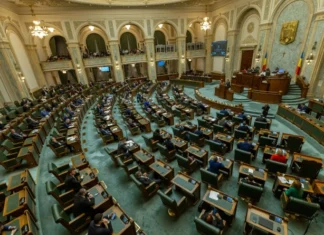G4Media recently reported on comments made by Bolojan regarding the potential inclusion of the USR party in the governing coalition. Bolojan emphasized that it would be beneficial for USR to join the government, particularly in the context of impending restructurings. He believes that no matter the debate surrounding government policies, the reality is that these restructurings are necessary and unavoidable.
Bolojan’s assertion highlights a concern that, without these critical changes, the country risks facing severe economic repercussions in the future. He pointed out that failing to address these issues would only delay an inevitable crisis, drawing parallels to the hardship experienced during the Boc government. His words serve as a reminder of the cyclical nature of economic challenges and the necessity of proactive measures to prevent falling into similar situations again.
The discussion underscores a wider sentiment about governance and the role of political parties in addressing systemic issues. The involvement of the USR may bring fresh perspectives and solutions, which could be crucial as the government navigates financial turbulence. Bolojan expresses a sense of urgency, suggesting that the timing is crucial for implementing reforms that can stabilize the economy and safeguard against future crises.
Moreover, Bolojan’s remarks reflect the complexities of coalition politics in Romania. The partnership between various political entities is vital for creating a stable government capable of tackling pressing issues. By inviting the USR to join the governing coalition, Bolojan hopes to foster a collaborative environment that prioritizes economic stability and long-term planning over short-term political gain.
As the political landscape continues to evolve, discussions like these become essential in shaping public discourse about governance. The emphasis on urgent reform resonates with many who have experienced the consequences of inadequate government action in the past. The potential for a coalition that includes the USR could signify a shift towards more comprehensive governance strategies, as political leaders recognize the importance of united efforts in tackling complex challenges.
Bolojan’s recommendations also raise questions about the responsibilities of the government and the role of opposition parties. The dialogue around inclusivity in governance suggests a move away from divisive politics, prompting a collaborative approach to problem-solving. Engaging USR in governing could serve as a model for how political parties can come together in the face of crisis, demonstrating a commitment to the greater good rather than partisan interests.
In conclusion, Bolojan’s perspective on the need for USR’s involvement in the government reflects a critical understanding of the economic landscape and the necessity for reform. His warning against complacency resonates with historical lessons, reminding us that proactive governance is essential in building a resilient economy. As political dynamics evolve, the prospect of a united coalition could pave the way for innovative solutions to the multifaceted issues facing Romania today. The call for cooperation and shared responsibility in governance stands as a beacon of hope for future stability and growth in the region.






